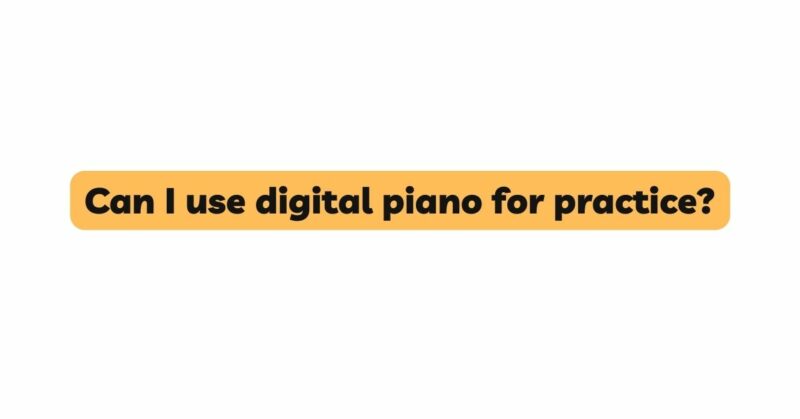Digital pianos are a great option for practicing piano. They are more affordable and portable than acoustic pianos, and they offer a variety of features that can help you improve your skills.
Here are some of the benefits of using a digital piano for practice:
- Affordability: Digital pianos are much more affordable than acoustic pianos. This makes them a great option for people who are just starting out or who are on a budget.
- Portability: Digital pianos are also much more portable than acoustic pianos. This means that you can take your digital piano with you wherever you go, so you can practice piano whenever you want.
- Features: Many digital pianos come with a variety of features that can help you practice piano. These features may include built-in lessons, accompaniment tracks, and metronomes.
- Feel: Some digital pianos with weighted keys can provide a similar feel to an acoustic piano. This can be helpful for developing finger strength and dexterity.
Here are some of the drawbacks of using a digital piano for practice:
- Sound quality: Digital pianos typically do not have the same sound quality as acoustic pianos. This can be a drawback for some people, as they may prefer the sound of an acoustic piano.
- Durability: Digital pianos may not be as durable as acoustic pianos. This means that they may not last as long, which can be a concern for people who plan on playing piano for many years.
- Habits: Some people believe that learning piano on a digital piano can lead to bad habits that can be difficult to break if you ever switch to an acoustic piano. This is because digital pianos typically have lighter keys than acoustic pianos, which can make it difficult to develop the finger strength and dexterity that are necessary for playing piano.
Is a digital piano a good option for practice?
The decision of whether or not to use a digital piano for practice is a personal one. There are pros and cons to both instruments, and the best option for you will depend on your individual circumstances and preferences.
If you’re on a budget or if you need a portable instrument that you can take with you wherever you go, a digital piano may be a good option for you. However, if you’re serious about learning piano and want the best possible sound quality, you may want to consider investing in an acoustic piano.
Ultimately, the best way to decide whether or not a digital piano is right for you is to try one out and see how you like it. If you’re not sure where to start, you can always talk to a piano teacher or visit a local music store.
Here are some additional tips for using a digital piano for practice:
- Make sure the digital piano has the features you need. Not all digital pianos are created equal. Some digital pianos come with a variety of features that can be helpful for practice, such as built-in lessons, accompaniment tracks, and metronomes.
- Set up your digital piano in a quiet place where you won’t be interrupted. You want to be able to focus on your practice without distractions.
- Set a timer for 30 minutes and practice every day. Even if you can only practice for 30 minutes a day, it will add up over time.
- Find a piano teacher who can help you track your progress and give you feedback. A piano teacher can help you identify any bad habits you may be developing and correct them.
- Don’t give up! Learning piano takes time and effort, but it’s definitely worth it in the end.


